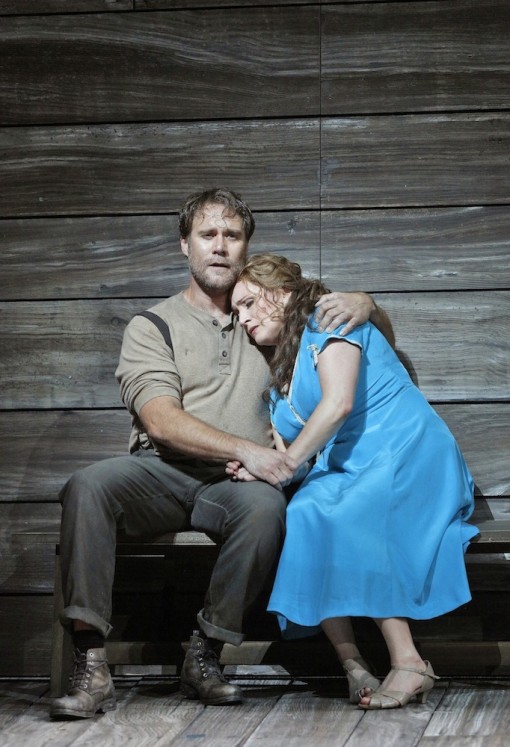San Francisco Opera delivers a powerful and visually striking “Susannah”

Brandon Jovanovich as Sam Polk comforts Patricia Racette in the title role of Carlisle Floyd’s “Susannah” at San Francisco Opera. Photo: Cory Weaver
It was an affecting sight to see the 88-year-old Carlisle Floyd take the stage of the War Memorial Opera House Tuesday night to an uproarious ovation following the performance of his Susannah at San Francisco Opera.
2015 will mark the 50th anniversary of Floyd’s opera, a pioneering work that, more than any other, showed that an opera by an American composer on an American theme, can stand with the finest European works in the genre. (Gershwin’s Porgy and Bess was still in its long performance twilight from which it has only emerged in the last decade.) Sadly, this milestone anniversary is otherwise being ignored by domestic opera companies, so all credit to SFO for giving Susannah its belated company premiere.
San Francisco Opera’s production is not perfect in all respects, but offers a striking and powerful performance of Floyd’s tale of the innocent Tennessee girl in the 1930s destroyed by small-town intolerance and religious hypocrisy.
Visually, the new production was virtually faultless. Erhard Rom’s sets create a stylized naturalism, with dry, gray clapboard walls evoking the rustic milieu of the poor Tennessee town, enhanced by projections of its green hills and valleys. A towering cross, later seen in empty outline and with glowing light, serves as a silent sentinel, a stark visual for the abuse of religion that leads to Susannah’s tragedy. Gary Marder’s lighting was exemplary and director Michael Cavanagh moved the action gracefully and naturally. Oddly, for a new production, SFO didn’t create new costumes, relying instead on Michael Yeargan’s decades-old wardrobe from a Susannah production that served as Renee Fleming’s Lyric Opera of Chicago debut.
At 49, Patricia Racette is undeniably a bit mature for the role of the naive 18-year-old girl who is destroyed by the religious hypocrisy of the Reverend Blitch and ostracized by the petty small-minded citizens of her valley town. Yet the soprano is such a convincing and resourceful actress that she made us believe in her Susannah. Racette brought a wistful fragile wonder to “Ain’t it a pretty night” and a pensive sense of folkish meditation to “The trees on the mountains.” She also made Susannah’s pain at her rejection, resigned capitulation to Blitch, and eventual renewed strength genuine and moving, as the forever damaged yet defiant figure of the final scene. A rock star with local audiences. Racette revived a prolonged ovation in this, her 25th anniversary year with the San Francisco company.
Raymond Aceto was dramatically credible as the Reverend Blitch, a religious leader who preaches salvation while using his position as a mask for sexual preying upon the innocent. Whereas such a role is so easily and frequently caricatured today, Floyd invested Blitch with a depth and surprising humanity, and Aceto effectively conveyed the conflicted and self-loathing nature of the preacher, a man aware of his human frailty but unable to conquer his sensual nature.
Vocally, however, Aceto was a disappointment and the clear weak link in this production. His middle-weight bass proved far too light an instrument for the role and lacked the necessary dramatic power and weight to make Blitch’s sermon register in the revival scene. Aceto even had to be slightly amplified in his spoken preaching, which still made for a light-in-the-loafers villain.
Brandon Jovanovich was ideal in every way, vocally and dramatically, as Sam, Susannah’s hard-drinking yet loving brother. The versatile American tenor brought a convincing accent to his portrayal, great relish to his “Jaybird song,” and convincing fury at Blitch’s seduction of his sister in Act 2. James Kryshak was equally effective as Susannah’s addled friend Little Bat, delivering a twitchy, neurotic characterization.
Catherine Cook was a properly odious figure as Mrs. McLean, the leader of the jealous harridans determined to persecute the young and pretty Susannah. Dale Travis, Timothy Mix, A.J. Glueckert and Joel Sorenson were a vivid and well-contrasted group of Elders. Under the direction of Ian Robertson, the SFO Chorus brought full-blooded fervor to the church revival and final scene.
Conductor Karen Kamensek made a mostly worthy SFO debut. There were moments of miscoordination between the singers and the pit early in the evening and voices were fitfully buried under the orchestra at climaxes. But Kamensek pointed the dramatic moments with sumptuous impact and consistently underlined the folk-like lyric beauty of Carlisle Floyd’s score.
Susannah runs through September 21 at San Francisco Opera. sfopera.com